|
In a bad – nay, frightening – year for democracy, equality, fairness, compassion and personal privacy (and I'm just talking about the UK here), a time when people seem to be increasingly defining themselves not by what they do or love but what or who they hate, it's been a surprisingly good year for film and home video releases. And let's not forget the occasional but worthy gems that cross the Atlantic from US TV, whose quality, imagination and intermittent daring is leaving mainstream American cinema looking downright formulaic and unadventurous by comparison. Old news, huh? The irony here is that some time ago I stopped watching live television, primarily because the regular TV channels – whatever they are any more – stopped showing anything I wanted to see and those premium US shows require subscription fees I cannot afford and refuse to cough up for on principal (I firmly believe that Rupert Murdoch is Satan). I thus tend to catch them either on disc or as recordings passed on by enthusiastic friends, usually a while after their first UK screening.
As regular readers will know, I also I tend to catch a good many films some time after their initial UK release. This is partly down to my non-metropolitan location and the conservative programming of our local cinemas – I'd have no trouble at all catching films I have no interest in seeing, but I sometimes have the devil of a time tracking down the ones that really interest me. This is particularly frustrating given the number of preview screenings I get invited to each week, many of which I would run to with my notebook in my hand if I lived in London. But as someone who has trouble balancing the books even out here in the sticks, how anyone can afford to live in our increasingly socially cleansed capital city these days is increasingly beyond me. I thus sometimes have to wait for films to make their way onto Blu-ray or digital download before I can see them, but the desire to catch them on the big screen is what first drove myself and two like-minded friends to set up a cinema-based film society that is now in its twenty-first and still well-attended year. While this does give local cineastes the chance to see a number of key independent and world cinema titles in the sort of venue that all films should ideally be viewed, our far-flung location and need to plan a good three months ahead means we often get to screen them after they've already hit the home entertainment market. Thus films released late in the year that appear on other people's best of 2015 lists will likely end up in my 2016 selection instead.
That said, this year I have tried (and failed, a bit) to restrict myself to films and TV series that had their first UK screening this year, and as usual am making no pompous claims that these are the best of a sizeable bunch, merely twenty titles that I particularly enjoyed in 2015. There are a fair few here that you'll find on a good many other lists of favourite films from the past twelve months and there's an inevitability to that; if a film excites you then there's a fair chance that like-minded others will have a similar response. That said, I appear to be one of the few people in in the western world who has neither seen no is in any real hurry to see Star Wars: The Force Awakens, despite being bombarded with Star Wars related emails from distributors and PR companies ("The force is with our new film!") over the past few weeks. I'd already become a little weary of the Star Wars world and is more obsessive fandom when I started this site back in 1993, and I've probably become even more cynical since. One day, maybe.
There are a fair few other titles that almost made the list but were just edged out by that indefinable thing that prompts you to connect with any work of art and/or entertainment on a personal level, and I've already stretched things beyond the generally favoured 10 to include 21 favourites,* with another 20 Blu-ray and DVD titles lined up for a second list that is soon to follow. I'll also give a mention to a few of the films and TV shows that didn't quite make the final selection at the end of the main list, all of which I'd suggest are well worth checking out.
Since I dislike the idea of rating films against one another, the titles below have been listed purely in alphabetical order and not how I think they stack up against each other.
| Films and TV: 21 personal favourites |
|
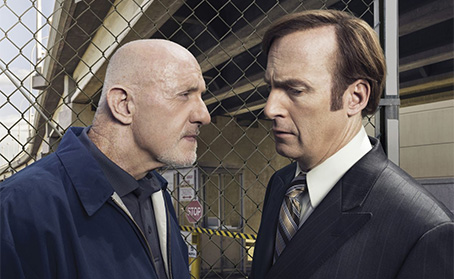
Better Call Saul: Season 1
Spin-off series of successful shows never seem like a good idea, and the prospect of building an entire series around one of the quirkier supporting characters from the hugely successful Breaking Bad struck me as naff from the moment I first heard about it. But by tripping back to the early days of shifty lawyer Saul Goodman (deliciously played by Bob Odenkirk) and exploring his relationship with his elder brother Chuck, a respected attorney who was forced to retire due to the onset of electromagnetic hypersensitivity, Breaking Bad creator Vince Gilligan fleshes out the character and made me feel for him a way that I never believed that I would. But the real masterstroke was the decision to include Saul's early encounters with former police officer and later drug trade 'cleaner' Mike Ehrmantraut, who as played by a deliciously world-weary (and middle-aged – hoorah!) Jonathan Banks may well be the coolest character currently on TV; his episode 9 encounter with overly cocky protection specialist Sobchak (hilariously played by Steven Ogg, who gamers will know primarily for his work as Trevor in Grand Theft Auto 5) is utterly priceless.
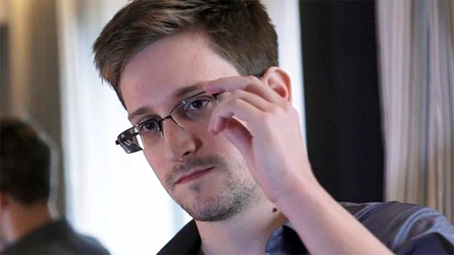
Citizenfour
Alan J. Pakula's All the President's Men remains a miracle of 70s American cinema for one simple reason – despite the fact that we all knew how the story ended before we sat down to watch it for the first time, it was tense and exciting from an early stage and just never let up. Almost 40 years later, documentary filmmaker Laura Poitras pushed the same magic button with Citzenfour, her intimate record of the first meetings between Guardian journalist Glenn Greenwald and the world's most currently famous whistle-blower, Edward Snowden. Crucially, Poitras was there from the start, having been directly contacted by Snowden using encrypted messages, and despite the fact that the majority of the film consists of quiet conversations conducted in a Hong Kong hotel room and that we all know how the story ultimately played out, this proved to be the year's most nail-biting thriller. The small bombshells delivered by Snowden in the course of his conversations with Greenwald also saw me change my own approach to on-line security, something our present government is currently doing its damnedest to nullify by legitimising the recording of all of our on-line activity and making it illegal to use encryption that actually works. Watch this film, read Snowden's own writings and fight these would-be totalitarian bastards all the way.
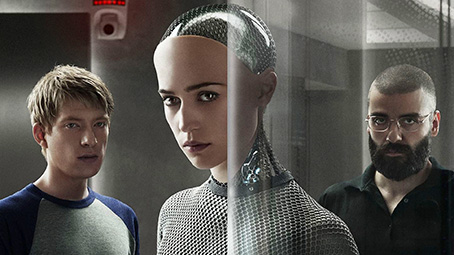
Ex Machina
It's been said that the difference between science fiction literature and science fiction cinema is that the intellectual elements of the novels too often get seriously watered down or even abandoned by their cinematic equivalent, which is why we treasure films that are as intellectually rewarding are they are visually spectacular like 2001: A Space Odyssey. More than once in recent years, it's the smaller independent films like Primer that have delivered the genre smarts, and in 2015 it was writer Alex Garland's directorial debut that walked away with this sf cinema badge of honour. The story has programmer Caleb win a week-long visit to the home of reclusive software company boss Nathan, where he is asked to interact with a beautiful female robot that is host to the world's most advanced artificial intelligence. For the most part a dialogue-driven three-hander whose CGI effects are so organic to the story and characters that I genuinely forgot I was looking at CG at all, it's a fascinating and immensely satisfying work that would be a great starting point for a detailed debate on the true nature and definition of sentience. Personally I'm really looking forward to Garland's next feature, an adaptation of Jeff VanderMeer's science fiction thriller Annihilation.
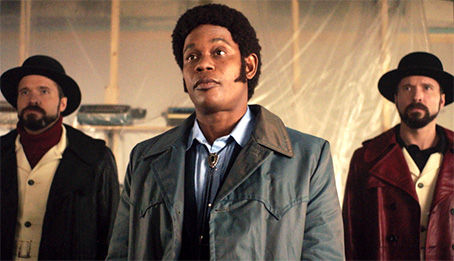
Fargo [Seasons 1 and 2]
I came late to the first series of the TV spin-off of the Coen brothers' superb 1996 feature Fargo, for the simple and hopelessly prejudicial reason that the very idea that turning such a film into a made-for-TV mini-series struck me as patently absurd. But enthusiastic word-of-mouth eventually prompted me to give it a look and I was sold from the first episode and never looked back. Capturing the tone of the movie but going its own inventive way with story and characters, series creator and primary writer Noah Hawley delivered a work that not only gave the original a serious run for its money, but was widely championed as one of the film and TV highpoints of the year. Despite strong turns from Martin Freeman, Colin Hanks and newcomer Allison Tolman, it was Billy Bob Thornton who stole the first season as a hit man who seemed to enjoy playing with his prey and bringing out the worst in those who interested him. The second season screened in the autumn and told a new but similarly toned story with different characters and absolutely lived up to our now high expectations. A more evenly balanced ensemble piece than its predecessor, in the spirit of the original it made every character register, though almost all of my favourite moments belonged to either Zahn McClarnon as Native American hit man Hanzee Dent, or Bokeem Woodbine as cheerfully philosophising African-American gangster Mike Milligan.
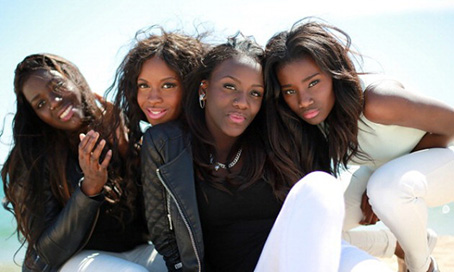
Girlhood [Bande de filles]
Tomboy writer-director Céline Sciamma sidesteps cultural clichés with this thoughtfully handled tale of a young black teenager whose failing grades see her fall in with a trio of local troublemakers, with whom she discovers a new found self-worth and sense of belonging, but this lifestyle change brings its own set of issues. The film shines in Sciamma's low-key direction and the refreshingly honest performances from its quartet of young female leads, and it celebrates the bonds of friendship without ever giving way to sentimentality or dramatic overstatement. The scene in which the four girls mime to Rihanna's Diamonds is quite possibly the most joyously upbeat sequence I've smiled through all year.
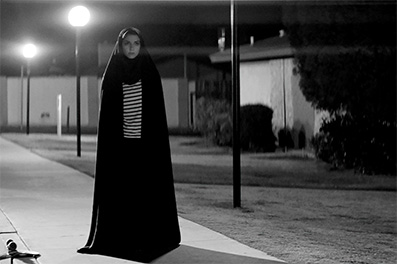
A Girl Walks Home Alone at Night
Of course we all now know that the first Iranian vampire film is actually American in origin and shot in California, where the Kern County town of Taft doubles up as the run-down and fictional Iranian municipality of Bad City, but that didn't stop Iranian-American writer-director Ana Lily Amirpour from turning in the coolest vampire movie of recent years. Shot in moody monochrome and fearing a taciturn, chador-wearing female vampire who glides through the streets on a stolen skateboard, it also has one of the neatest soundtracks you'll find in a recent horror-themed film.
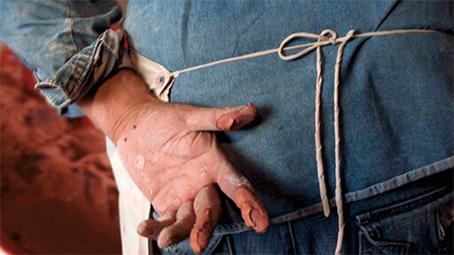
Hand Gestures [Il gesto delle mani]
In the end I didn't catch as many films as I had hoped to at this year's London Film Festival, but of those I did see none beguiled me more than Francesco Clerici's beautifully pared-down documentary record of the ancient process lost wax bronze casting. The film resolutely cuts against the modern documentary grain by using none of the format's current visual and aural tics and even excludes elements you expect to be there by default, with no narration or captions to explain or expand on the various stages of the process being meticulously observed, which are all carried out in studious silence. The result is an unexpectedly compelling experience and a refreshingly rare chance to just sit back and appreciate the work and collective skills of a dedicated group of master craftspeople.
Full LFF review here >>
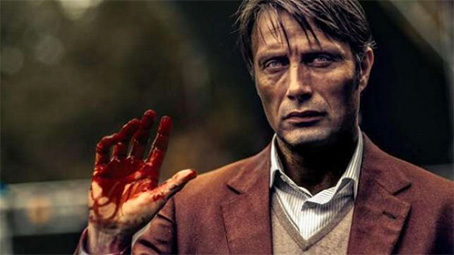
Hannibal: Season 3
When I originally posted a list of 20 titles, I completely missed this one and it took a while to work out exactly why. The reason was actually simple – I only caught up with this series at all in 2015, and having become instantly hooked I binged on all three seasons in a row, and only later realised that the third season actually premiered on US TV in June of this year. My delay in watching the programme at all steemed from my uncertainty about the idea of a TV series based around the characters of of Hannibal Lecter and FBI investigator Will Graham, but phenomenal word-of-mouth and some strong reccommendations from friends eventually did the trick. Following the devastating finale of Season 2, Season 3 got off to an intruging but initially opaque and tonally downbeat start, crawling inside the head of its lead characters (brilliantly played by Mads Mikkelsen and Hugh Dancy) for the first four episodes to such a degree that I gave it a break for a couple of weeks just to lift my spirits. But once the series moved into Red Dragon territory it was soon firing on all cylinders again, and proved to be as darkly sinister and intelligently gripping as it ever was, and built to a final episode whose conclusion left us wondering just where it would have gone in Season 4 had the series itself not been criminally cancelled.
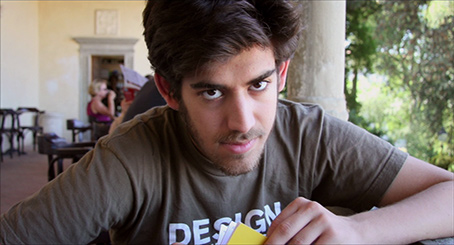
The Internet's Own Boy: The Story of Aaron Swartz
If you're not clued in to the world of computer programming and on-line political activism then you may well not have heard of Aaron Swartz – the name was certainly new to me when I first sat down to watch this revealing, moving and ultimately inspiring documentary from Brian Knappenberger, a superb companion piece to his 2012 portrait of the rise of Anonymous, We Are Legion: The Story of the Hacktivists. Swartz was a genuine inspiration, a young computer genius who turned his back on the potential riches that his talent could easily have bought him and instead put it to use in the pursuit of social justice. As a result he was hounded by the security services and at the age of just 25 he took his own life, a death his father holds the American government accountable for. An unfussy blend of interview and archive material, the film tells an important story in an enthralling manner, and deserves to be far more widely seen than it probably has been.
Full DVD review here >>
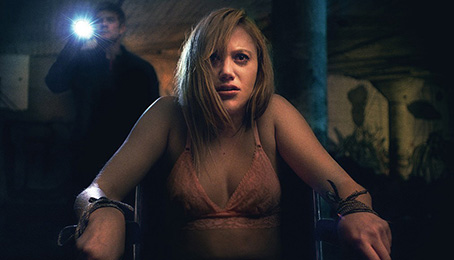
It Follows
I may be banging a now well-beaten drum here, but I do so unapologetically and with bloody good reason. For some years now the American horror film has been languishing in a swamp of uninspired remakes, tacky sequels and winking at the audience, all of which has had us longing for a return to the genre's halcyon days and the independent and drive-in gems of the 1970s. For years we've been waiting for another Halloween and this year we got it in the shape of David Robert Mitchell's superbly devised and crafted (and sublimely titled) It Follows, a horror tale blessed with a brilliantly simple and watertight central concept that transforms the simple act of someone walking towards you into the most terrifying thing in the world. A set of nicely pitched performances from the young cast really help to sell it, and there were a couple of times here where I really did crawl backwards out of my seat with widened eyes muttering “oh shit!” at an unreasonable volume.
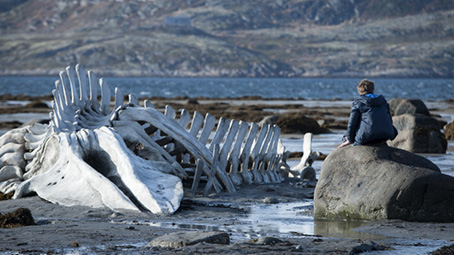
Leviathan
The most downbeat and overtly political film yet from Russian director Andrey Zvyagintsev, who made a serious impact with his first two features The Return and The Banishment. Here, he sets his sights on the corruption inherent in the new Russian capitalism (well, capitalism in general if the truth be told), as volatile mechanic Kolya is faced with losing the home he built due to a compulsory purchase order issued by crooked mayor Vadim, who has his own plans for the prime spot on which it is located. According to Zvyagintsev, the film was inspired by the true story of American welder Marvin Heemeyer, who in 2004 destroyed a number of buildings with an armoured bulldozer after his appeals against the construction of a cement manufacturing plant next to his shop had failed, though others have seen it as an updating of the Book of Job. If you're looking for a film that leaves you with a smile on your face then you've come to the wrong boy, but this is still gripping and socially relevant cinema and confirms Zvyagintsev's position as one of the most important of the new generation of Russian filmmakers.
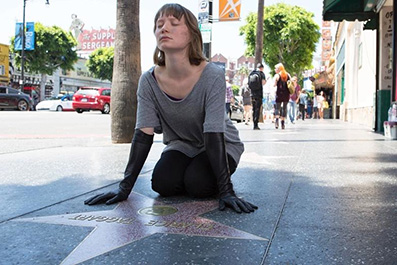
Maps to the Stars
The decision by our local cinemas not to screen David Cronenberg's most recent feature delayed my first viewing of the film until we were able to book it for the film society, but it proved worth the wait. Scripted by Bruce Wagner, Maps to the Stars is a bitingly acidic satire that paints Hollywood as a breeding ground for the hopelessly insecure, opportunistic bullshitters, deluded hangers-on, rampant addiction and monstrously egotistical child stars. Julianne Moore is terrific as neurotic fading star Havana Segrand, and as obnoxious young superstar Benjie Weiss, Evan Bird could prompt even the most tolerant of adults to see an upside to beating a kid senseless. But for me it's Mia Wasikowska as a young and seemingly star-struck burns victim whose homecoming kicks off a destructive chain reaction who quietly steals the film.
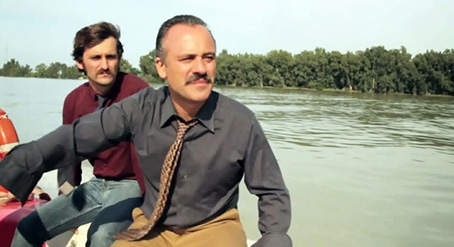
Marshland [La isla minima]
In politically and economically tumultuous post-Franco Spain, two mismatched city homicide detectives, both temporarily reassigned for pissing off their superiors, arrive at a small southern town to investigate the disappearance of a local girl and unexpectedly find themselves hunting a serial killer. Directed and co-written by Alberto Rodríguez, Marshland is a compellingly structured and directed police procedural thriller in which the story is told exclusively from the viewpoint of the investigating detectives, its events and characters given considerably more bite by the film's strong and ultimately unsettling socio-political undercurrents. As a bit of a sucker for police procedural cinema I'll freely admit I was drawn to this one by default, but this was one film that genuinely exceeded my expectations and one that I found myself pushing others to see. Which is kind of what I'm doing here too, as it happens.
Full DVD review here >>
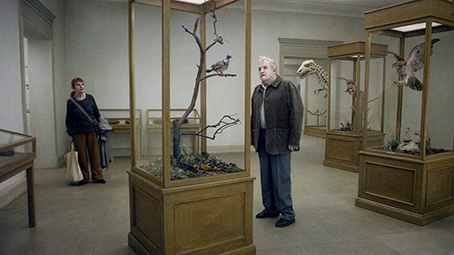
A Pigeon Sat on a Branch Reflecting on Existence
[En duva satt på en gren och funderade på tillvaron]
Swedish director Roy Andersson is one of those hallowed filmmakers whose cinema completely unifies opinion here at Outsider. Actually, I should probably qualify that by stating that we're talking specifically about Songs From the Second Floor and You, the Living, uniquely toned films that reject narrative storytelling and instead are constructed from stand-alone but often slyly connected vignettes, each captured in a single and usually static wide shot. But remarkable things happen within these seemingly immobile frames, allowing Andersson to make witty observations about the human condition or the politics of corporate capitalism with a deft and sometimes hilarious blend of truth and absurdist surrealism. A Pigeon Sat on a Branch Reflecting on Existence is the third film in his self-proclaimed 'Living' trilogy that began with the two above-mentioned titles and in terms of style and content is more of the same, but you'll find no complaints here. It may not have the instant hook of the interconnected opening scenes of You, the Living, but this is still Andersson in full creative flow, and there's not a scene here that didn't put an admiring or delighted smile on my face; despite knowing that digital manipulation had to have been involved, the sequence in which the country's present and its military past collide in a modern-day café is jaw-dropping for the background action alone.
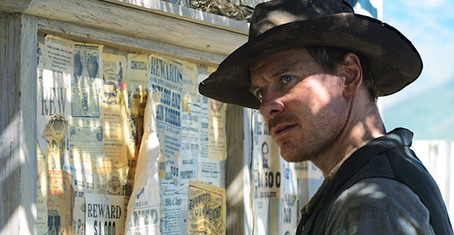
Slow West
The first feature from ex-Beta Band member John Maclean struck such a critical chord on its release that it's now become quite the thing to claim it was overrated, but I'm having none of it. Set in a colour saturated vision of the Old West, the film features an androgynous Kodi Smit-McPhee as young Jay Cavendish, who has come to America in search of his lost love Rose, unaware that she and her father have a price on their heads. We're seeing rather a lot of Michael Fassbinder at the moment, but he's splendidly cast here as gunslinger Silas Selleck, who persuades this naïve youth to hire him as a guide and as protection from the very real dangers that lay ahead, but unbeknownst to Jay, Silas also has his eye on the bounty. Quirky and offbeat in the best sense of both terms, right down to the unusual 1.66:1 framing, it's a film littered with inventive touches and unusual takes on familiar genre tropes, and in spite of its downbeat moments, for me was one of the most enjoyable film experiences of the year.
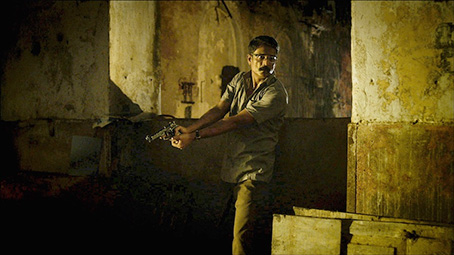
Sunrise
The issue of child abductions was the focus for one of the strongest and most haunting films I saw at the London Film Festival, but the work in question was not a documentary but a moody and at times disorientating noir police thriller from Indian director and co-writer Partho Sen-Gupta. Adil Hussain stars as Mumbai police Inspector Joshi, who is still deeply haunted by his daughter's abduction ten years earlier and continues to hunt for young girls who go missing and end up as prisoners of the city's sex trade. Repeatedly the film switches its focus from Joshi's work and his troubled home life to the fate of one of the abducted girls, Komal, and her attempts to protect new young arrival Naina from the fate that awaits her. The constant rainfall that seems to oppress the city feels at times like an externalisation of Joshi's anxiety and sense of loss, and the subjective shifts from reality to what may or may not be daydreams or memories will keep even observant viewers on their feet. As with Hand Gestures, no formal UK release has been announced yet. We can only hope.
Full LFF review here >>
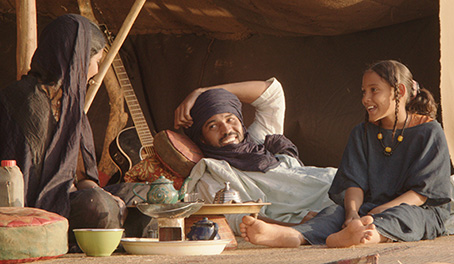
Timbuktu
Mauritanian director Abderrahmane Sissako first came onto my radar with a bang back in 2007 with the extraordinary Bamako, in which the World Bank and the International Monetary Fund were put on trial in the courtyard of a small African town for the country's financial woes. A bold, inventive and quietly passionate work, it made for compelling and politically persuasive viewing. Frustratingly, it was to be another eight years before Sissako got to direct another feature, but Timbuktu was most definitely worth the wait. It tells the story of a Mali cattle herder and his family, whose peaceful lives are gradually transformed when a group of armed jihadists arrive in the nearby town and begin enforcing sharia law. One of the real strengths of Sissako's remarkable film is that while it highlights the absurdities and rank hypocrisies of fundamentalism, it avoids over-simplification and self-righteous sermonising and even has moments of genuine humour, yet the cruelty and moral destructiveness of religious extremism are still brought powerfully home.
Full review here >>
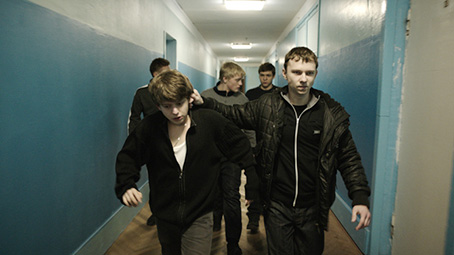
The Tribe [Plemya]
A boy arrives at a new school and soon finds himself recruited by its most troublesome youth gang; initially pushed around, he soon makes his mark, then a chance event sees him move up in the gang's hierarchy. You may think you've seen this all before, but I can pretty much guarantee you won't have seen in play out like it does in Ukranian writer-director Myroslav Slaboshpytskiy's extraordinary drama. Set in a specialist school for the deaf, every exchange in the film is conducted in sign language with no subtitle translation and no audible dialogue, while the action is captured in long single takes, often in static or fluidly moving wide shot (full marks here to Valentyn Vasyanovych's consistently excellent scope Steadicam cinematography) with no musical accompaniment. Theoretically this should put us at a distance and lock us out of every conversation, but the expressiveness of the performers and Slaboshpytskiy's precision direction ensure that all narrative turns are easy to follow and the thrust of the dialogue is always clear. Violent and sexually explicit in places, it's sometimes uncomfortable but always compelling viewing, and you'll not forget the chilling final scene in a hurry.
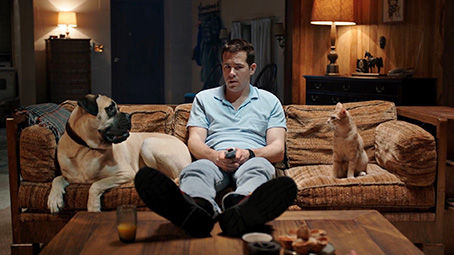
The Voices
One of the first and only times I've been pulled to a film by the early reactions on Twitter; normally I'm not remotely suckered in by social media frothing (positive tweets are actively reposted by the distributors of the films in question, and the negative ones always cheerfully ignored), but something about the nature of the comments for this particular film had me intrigued from an early stage. It didn't hurt that it was the first English language film from Persepolis director Marjane Satrapi, but even after reading up on it in advance, I don't think I was even remotely prepared for what Satrapi and screenwriter Michael R. Perry delivered. Ryan Reynolds is a delight as Jerry, an impossibly cheerful factory worker who has a crush on pretty office worker Fiona (Gemma Arterton) and has regular conversations with his soulful dog Bosco and his foul-mouthed and sarcastic cat Mr. Whiskers. But Jerry has a dark secret lurking in his past, and when a chance date with Fiona takes a tragic turn, his idealised view of the world begins to seriously fracture. The Voices is a gift-wrapped future cult movie, one whose gloriously realised bubble-gum surface and jet-black humour is increasingly punctured by the disturbing realisation of what Jerry is actually doing, and Jerry's own realisation of who he really is.
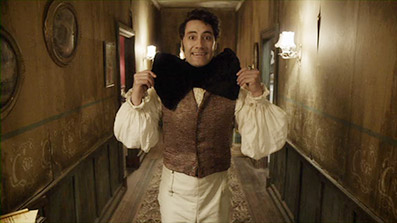
What We Do in the Shadows
What would you get if you allowed a film crew in to document the lives for four vampires who share a suburban house? That was the starting point for Jemaine Clement and Taika Waititi's delicious and intermittently riotous horror-comedy, one whose critical success enabled the trailer making to plaster the word “hilarious” on screen 12 times, each quoted from 12 separate reviews. And it is damned funny and a lot smarter than I was expecting, an imaginative and delightfully performed coffin of fun peppered with quotable gags and moments that you find yourself rewinding to immediately watch again.
Full DVD review here >>
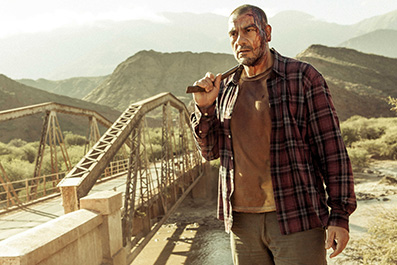
Wild Tales [Relatos salvajes]
The third feature from Argentinean writer-director Damián Szifron looks likely to be seen later as his breakthrough film, being six stories built around the theme of revenge, all different in tone and structure and all dynamite stuff. Kicking off with what has to be my favourite pre-title sequence of the year (the final freeze frame is an outrageous hoot), it nails something that precious few portmanteau films ever pull off by making the lead characters in each of the stories register at an early stage so that we actually have some investment in their fate. It's hard to pick a favourite story here, but I'll give a shout for the road rage clash that escalates in blackly comic steps to an hilarious pay off, the demolitions expert who finds himself in angry conflict with parking regulators when his car is towed away, and the timely reminder that the rich will always try to buy their way around justice, whatever the human cost.
Below are a few titles that didn't quite make the final list. There are probably a lot more, but the end of year has been a little traumatic (serious family illness and hospitalisation) and thus you'll have to forgive any glaring omissions.
Amy
Asif Kapadia's intimate and revealing documentary portrait of singer Amy Winehouse, compiled entirely from footage shot by family and friends.
Chemsex
William Fairman and Max Gogarty's eye-opening peek into a darker side of London's gay dating scene. Film review >>
Clouds of Sils Maria
A thoughtful study of self-doubt, ageing and celebrity identity from writer-director Olivier Assayas that boasts a class performance from Juliette Binoche as past-her-prime actress Maria Enders.
The Homesman
A solid second feature from Tommy Lee Jones in his role as director that features fine performances from Hilary Swank and Jones himself.
Kumiko, the Treasure Hunter
A based-on-true-story fable inspired by an urban myth in which a young Japanese woman goes in search of the suitcase full of money buried by Steve Buscemi in the Coen Brothers' original Fargo.
Mad Max: Fury Road
Jaw-dropping stunt work and action sequences (nice to see a 70-year-old director showing younger filmmakers how it should be done) in a film that felt more like a comic book adaptation than most actual comic book adaptations. Cool to see an action movie with female leads, but Tom Hardy almost faded into the background as Max. Film review >>
Pelo malo [Bad Hair]
A nicely handled tale of prejudicial parental fears from Venezuelan writer director Mariana Rondón.
Silicon Valley
Mike Judge's witty and engaging satirical comedy in which a start-up group of tetchy but oddly likeable programmers do battle with a Google-like corporate giant hit its second season in 2015 and the quality didn't drop, despite being constructed around a similar narrative arc to season 1.
Steve Jobs
A cleverly structured three-act play that never for a moment feels like this is how things actually happened, this lively portrait of computer icon Steve Jobs unsurprisingly shines in Aaron Sorkin's fiery dialogue exchanges, and is driven along at a spanking pace by Danny Boyle's almost invisible direction and Michael Fassbender's captivating turn as Jobs.
True Detective: Season 2
This one so nearly made it onto my list as a bit of a fuck-you to all those who complained that it was disappointing or depressing or that they were somehow confused by the plot development. I thoroughly enjoyed it, had no problem following the story and found its relentlessly downbeat tone rather enthralling. So there.
Very Big Shot [Film Kteer Kbeer]
Another London Film Festival UK premiere, Lebanese writer-director Mir-Jean Bou Chaaya's enjoyable blend of crime drama and film industry satire may undergo a bit of a tonal switch mid-way, but the second-half comedy is nicely pitched and some rather neat political points are made. Here's hoping the film gets a wider release. LFF film review >>
The Wonders [Le meraviglie]
A multi-layered coming-of-age tale and lament to lost youth and changing times from Corpo celeste writer-director Alice Rohrwacher.
The Wrecking Crew.
A revealing documentary about the loose group of talented session musicians who played on many of the biggest hits from the 60s and 70s. The film took 12 years to make then another 7 to raise the money for the rights to include the songs on its killer soundtrack.
* There were originally 20 titles, but I completely forgot about season 3 of Hannibal, and there was no way that was not making this list.
|